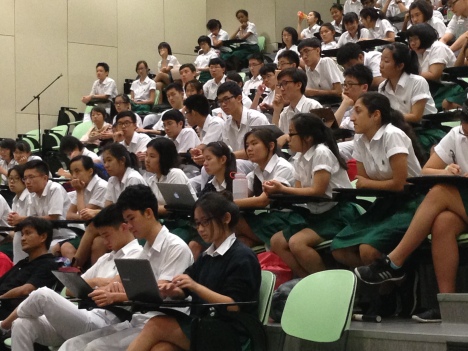Gabriel and team were invited to his alma mater Raffles Institution on 16th April as part of Heartware 2014, organized by the Community Advocates of the school.
He spoke on the work of the foundation and helped Rafflesians understand how their efforts in collecting used shoes contribute to the community in Idsowe, Kenya through the Mitumba project.
Here’s an extract of the article by Joyce Er, Marcus Tan, Christine Saw and Martin Lim :
That same day, a talk was also held to help establish the right attitude towards the final instalment of Heartware, Feel It! No Shoes Day. Over the past two years, this has been held alongside the Shoe Collection Drive that CA holds in partnership with the Tana River Life Foundation (TRLF). This is a charitable organisation situated in Kenya, which aims to provide dignified aid to marginalised locals. The talk was conducted by Rafflesian alumnus and TRLF founder, Mr Gabriel Teo, about his organisation’s schemes and the ethics he believes should underpin any acts of social service. He was accompanied by three Kenyan youth beneficiaries of TRLF’s programmes, including the Mitumba Project which the Heartware shoe collection drive is contributing towards.
Mr Teo began with a preamble on the principles underpinning his work. He warned against heroism and ‘creating dependency’ or a culture of slacktivism, which he characterised as ‘playing with people’s lives for your own ego’. Passionately decrying shortsighted, one-off welfare projects that fail to prioritise human lives, he said, “Community is understanding that it is not about output or numbers you generate, it’s about outcomes, and how are lives changed for the better.”
After touching on schemes geared towards subsidizing education for Delta students, Mr Teo provided detailed information about the Mitumba Project, which is behind Heartware’s Shoe Collection Drive. Mitumba, or ‘recycled goods’ in Swahili, is a microfinance scheme set up in 2004 and one of TRLF’s entrepreneurship courses. In addition to shoes, Mitumba also collects clothes and bags, which are then sorted and either sold or used for the course.
The microloan scheme, essentially a form of repackaged financial assistance, operates over 4-5 months. In the first month, 100 pieces of clothing and 20-30 pairs of shoes are loaned on good faith to interview-selected applicants, mostly women with dependents such as children studying in secondary school or with chronic disease. Participants market and sell their wares to locals for about 400-500% profit. The sale of all their shoe stock, with a pair going for approximately $4.20, can pay for about a term’s school fees. In the subsequent months, they repay their loans and purchase more stock to sell. Participants must remain accountable, presenting monthly receipts accounting for their income and expenditure.In response to a question about the sustainability of a scheme in which TRLF still provided the shoe stock, Mr Teo clarified that Mitumba ‘is not intended to be a major source of assistance’, and practically only ‘gives them a boost’. The real intention, Mr Teo stressed, was to ‘preserve dignity as you assist, through dignified giving and dignified receiving’, as opposed to a condescending ‘beggars can’t be choosers’ attitude on this end, or a sense of passive dependence on the other.
Since the overwhelming majority of students in attendance were CA members or Councillors, the outreach for this talk was admittedly seriously limited. This was unfortunate, as the talk did have important messages to share. Especially in light of Acta Non Verba, those in attendance found the talk useful in clarifying exactly how the Mitumba project works, and understood TRLF’s guiding mindsets of aid with dignity in relation to No Shoes Day. Lum Qian Wei, a Y5 member of CA, succinctly summed up her takeaways, “I found it useful. The TRLF emphasises self-reliance and preserves the dignity of the beneficiaries as ultimately, beneficiaries have to put in their own effort to run the businesses. I think No Shoes Day serves to remind us how fortunate we are, and helps us empathise with the poor; this ties in nicely with the TRLF’s principle of treating everyone with respect regardless of his background or status, and not slipping into condescension.”
The complete article is available on http://rafflespress.com/2014/04/27/wareming-hearts-heartware-2014/
Filed under: Tana River Life Foundation | Tagged: Gabriel Teo | 1 Comment »








